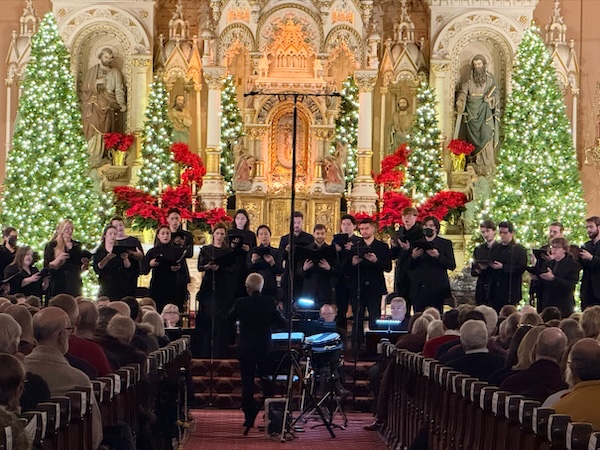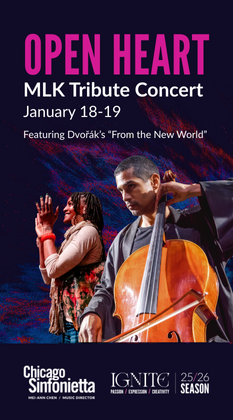Performances
Mäkelä, CSO wrap the year with bracing contemporary works, Beethoven and Schumann
The final Chicago Symphony Orchestra program of 2025 offered much to […]
Beset by illness, Apollo’s Fire still finds spark for Praetorius confection
December is an excellent time for concert-going, as most every classical […]
Bella Voce refreshes the mind and spirit with Baroque Christmas program
There are countless choices for seasonal concerts to provide sustenance this […]
Articles
Critic’s Choice
Gluck: Orfeo ed EuridiceDame Jane Glover/Music of the BaroqueSeptember 14-15 Music […]
Concert review
Kraemer-led MOB choral program provides customary holiday warmth

Music of the Baroque has put in some Christmas overtime this month. Dame Jane Glover began December with an expansive, nearly complete Messiah before taking the MOB Chorus on the road to lead that work with the New York Philharmonic two weeks later.
This week MOB returned to their annual Holiday Brass and Choral Concerts, an evergreen tradition that dates back to 1979 and the earliest years of the group, which is currently celebrating its 55th anniversary season. Friday’s performance took place at its customary venue of Old St. Michael’s Church in Old Town, one of the original churches founding director Thomas Wikman selected to host the yuletide performances.
Typically, the MOB chorus director—currently Andrew Megill—has curated and conducted these evenings. This year longtime MOB principal guest conductor Nicholas Kraemer was at the helm for the first time, part of the Briton’s ongoing 80th birthday celebrations.
In contrast to some years, Kraemer assembled a program grounded primarily in the 15th to 17th centuries, featuring luminous Christmas music of the Renaissance and high Baroque, though largely eschewing any overarching narrative or thematic framework beyond the Christmas story.
One small unifying element, however, was the hymn “Nun komm, der Heiden Heiland” (“Savior of nations, come”), which was heard in four different treatments. The chorus sang the 1524 plainchant with robust monophony, before segueing into Praetorious’ more intricate polyphony, which Kraemer led with graceful equipoise.
Soprano Susan Nelson and alto Margaret Fox produced a seamless blend in Bach’s setting from Cantata 36, though they overpowered the thin continuo of cello and box organ. Scheidt’s version began in an austere vein before blossoming into more lush textures, completing an engaging picture of what three luminaries made of the same material.
The chorus processed into the sanctuary singing the swaying strains of the traditional “In dulci jubilo,” which was also heard in a version by Robert Lucas Pearsall, whose 1856 death made him the night’s most contemporary composer. Pearsall’s evocative arrangement is in a 19th-century harmonic idiom, and featured a supplely blended quartet of soprano Rachel Sparrow, alto Fox, tenor Samuel Rosner, and bass Ian Morris. These four provided many eloquent highlights throughout the night, particularly in the anonymous English “Coventry Carol” from c. 1591, where they sang by a shrine halfway back in the church.
Further selections of Bach, des Prez, Palestrina, Praetorius, and Monteverdi kept the evening in a solidly liturgical context. Kraemer drew the usual accomplished vocalism from the MOB chorus, some harshness in the top sopranos notwithstanding, though by the end of the evening the largely unvaried repertoire was starting to feel repetitive.
Still, Gabrieli’s “Omnes gentes plaudite,” scored for antiphonal choruses and brass in the spirit of Venice’s Saint Mark Basilica, provided a rousing punctuation mark to the night’s second set, with declamatory chorus lines bouncing off the gleaming brass consort, and soprano Nelson fulsomely soaring in her solo moments.
With the exception of a lapse-laden opening fanfare for two trumpets, the brass ensemble of four trumpets and four trombones played with a burnished collective timbre in the evening’s many Renaissance selections. MOB stalwart Barbara Butler led the octet, and while her playing has been a highlight of MOB concerts for decades, she was a fitful source of insecurity for her colleagues Friday night.
Stephen Alltop kept the generous program knit together with his inventive organ interpolations, and isolated numbers like “Tappster dryngker” (a 15th-century drinking song) and Megill’s tintinnabulatory arrangement of “Ding Dong! merrily on high” provided welcome moments of contrast.
The evening concluded in traditional fashion, with the Solemn Tone “Te Deum laudamus,” and Praetorius’ “Es ist ein Ros’ entsprungen,” ending on a note of inward Christmas warmth before sending the audience into the gelid night.
Music of the Baroque’s Holiday Brass and Choral program will be repeated 2 p.m. Saturday at Saints Faith, Hope & Charity Catholic Church in Winnetka, and 2 p.m. Sunday at Alice Millar Chapel in Evanston. baroque.org
Posted in Performances
No Comments
Calendar
December 21
Menotti: Amahl and the Night Visitors
Loch Sloy Productions
[…]
News
Winberg to step down as CEO of Grant Park Music Festival
It is the end of an era for the Grant Park […]

